.On the 1st day of July, 1853, I was commissioned a brevet second lieutenant in the First Regiment of United States Infantry, then stationed in Texas. The company to which I was attached was quartered at Fort Duncan, a military post on the Rio Grande opposite the little town of Piedras Negras, on the boundary line between the United States and the Republic of Mexico.
a military post on the Rio Grande opposite the little town of Piedras Negras, on the boundary line between the United States and the Republic of Mexico.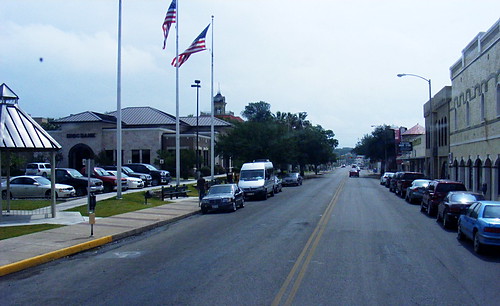
After the usual leave of three months following graduation from the Military Academy I was assigned to temporary duty at Newport Barracks, a recruiting station and rendezvous for the assignment of young officers preparatory to joining their regiments. Here I remained from September, 1853, to March, 1854, when I was ordered to join my company at Fort Duncan.
To comply with this order I proceeded by steamboat down the Ohio and Mississippi rivers to New Orleans, thence by steamer across the Gulf of Mexico to Indianola, Tex., and after landing at that place, continued in a small schooner through what is called the inside channel on the Gulf coast to Corpus Christi, the headquarters of Brigadier-General Persifer F. Smith, who was commanding the Department of Texas.
and after landing at that place, continued in a small schooner through what is called the inside channel on the Gulf coast to Corpus Christi, the headquarters of Brigadier-General Persifer F. Smith, who was commanding the Department of Texas.
 and after landing at that place, continued in a small schooner through what is called the inside channel on the Gulf coast to Corpus Christi, the headquarters of Brigadier-General Persifer F. Smith, who was commanding the Department of Texas.
and after landing at that place, continued in a small schooner through what is called the inside channel on the Gulf coast to Corpus Christi, the headquarters of Brigadier-General Persifer F. Smith, who was commanding the Department of Texas. Here I met some of my old friends from the Military Academy, among them Lieutenant Alfred Gibbs, who in the last year of the rebellion commanded under me a brigade of cavalry, and Lieutenant Jerome Napoleon Bonaparte, of the Mounted Rifles,  who resigned in 1854 to accept service in the French Imperial army, but to most of those about headquarters I was an entire stranger. Among the latter was Captain Stewart Van Vliet, of the Quartermaster's Department, now on the retired list. With him I soon came in frequent contact, and, by reason of his connection with the Quartermaster's Department, the kindly interest he took in forwarding my business inaugurated between us—a lasting friendship.
who resigned in 1854 to accept service in the French Imperial army, but to most of those about headquarters I was an entire stranger. Among the latter was Captain Stewart Van Vliet, of the Quartermaster's Department, now on the retired list. With him I soon came in frequent contact, and, by reason of his connection with the Quartermaster's Department, the kindly interest he took in forwarding my business inaugurated between us—a lasting friendship.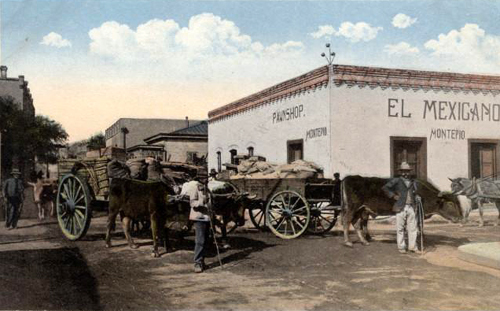
 who resigned in 1854 to accept service in the French Imperial army, but to most of those about headquarters I was an entire stranger. Among the latter was Captain Stewart Van Vliet, of the Quartermaster's Department, now on the retired list. With him I soon came in frequent contact, and, by reason of his connection with the Quartermaster's Department, the kindly interest he took in forwarding my business inaugurated between us—a lasting friendship.
who resigned in 1854 to accept service in the French Imperial army, but to most of those about headquarters I was an entire stranger. Among the latter was Captain Stewart Van Vliet, of the Quartermaster's Department, now on the retired list. With him I soon came in frequent contact, and, by reason of his connection with the Quartermaster's Department, the kindly interest he took in forwarding my business inaugurated between us—a lasting friendship.
(Cavalry) Mounted Services Uniform Jacket
Dark blue wool with yellow tape trim.
A day or two after my arrival at Corpus Christi a train of Government wagons, loaded with subsistence stores and quartermaster's supplies, started for Laredo, a small town on the Rio Grande below Fort Duncan. There being no other means of reaching my station I put my small personal possessions, consisting of a trunk, mattress, two blankets, and a pillow into one of the heavily loaded wagons and proceeded to join it, sitting on the boxes or bags of coffee and sugar, as I might choose. The movement of the train was very slow, as the soil was soft on the newly made and sandy roads. We progressed but a few miles on our first day's journey, and in the evening parked our train at a point where there was no wood, a scant supply of water—and that of bad quality—but an abundance of grass. There being no comfortable place to sleep in any of the wagons, filled as they were to the bows with army supplies, I spread my blankets on the ground between the wheels of one of them, and awoke in the morning feeling as fresh and bright as would have been possible if all the comforts of civilization had been at my command.
It took our lumbering train many days to reach Laredo, a distance of about one hundred and sixty miles from Corpus Christi. Each march was but a repetition of the first day's journey, its monotony occasionally relieved, though, by the passage of immense flocks of ducks and geese, and the appearance at intervals of herds of deer, and sometimes droves of wild cattle, wild horses and mules. The bands of wild horses I noticed were sometimes led by mules, but generally by stallions with long wavy manes, and flowing tails which almost touched the ground.
We arrived at Laredo during one of those severe storms incident to that section, which are termed "Northers" from the fact that the north winds culminate occasionally in cold windstorms, frequently preceded by heavy rains. Generally the blow lasts for three days, and the cold becomes intense and piercing. While the sudden depression of the temperature is most disagreeable, and often causes great suffering, it is claimed that these "Northers" make the climate more healthy and endurable. They occur from October to May, and in addition to the destruction which, through the sudden depression of the temperature, they bring on the herds in the interior, they are often of sufficient violence to greatly injure the harbors on the coast.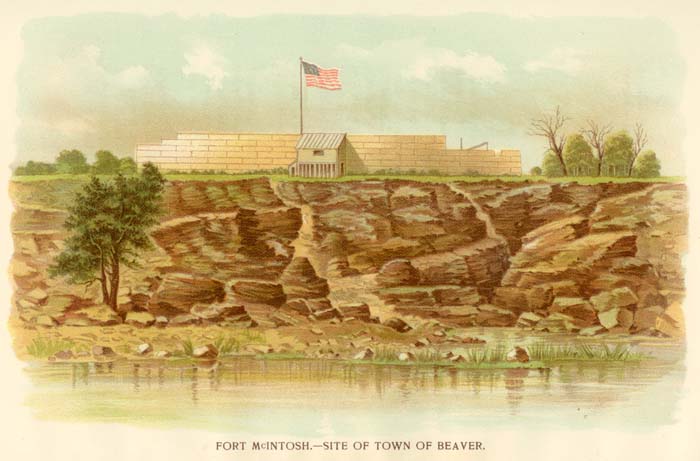

The post near Laredo was called Fort McIntosh, and at this period the troops stationed there consisted of eight companies of the Fifth Infantry and two of the First, one of the First Artillery, and three of the Mounted Rifles . Just before the "Norther" began these troops had completed a redoubt for the defense of the post, with the exception of the ditches, but as the parapet was built of sand—the only material about Laredo which could be obtained for its construction—the severity of the winds was too much for such a shifting substance, and the work was entirely blown away early in the storm.
. Just before the "Norther" began these troops had completed a redoubt for the defense of the post, with the exception of the ditches, but as the parapet was built of sand—the only material about Laredo which could be obtained for its construction—the severity of the winds was too much for such a shifting substance, and the work was entirely blown away early in the storm.
 . Just before the "Norther" began these troops had completed a redoubt for the defense of the post, with the exception of the ditches, but as the parapet was built of sand—the only material about Laredo which could be obtained for its construction—the severity of the winds was too much for such a shifting substance, and the work was entirely blown away early in the storm.
. Just before the "Norther" began these troops had completed a redoubt for the defense of the post, with the exception of the ditches, but as the parapet was built of sand—the only material about Laredo which could be obtained for its construction—the severity of the winds was too much for such a shifting substance, and the work was entirely blown away early in the storm.I was pleasantly and hospitably welcomed by the officers at the post, all of whom were living in tents, with no furniture except a cot and trunk, and an improvised bed for a stranger, when one happened to come along. After I had been kindly taken in by one of the younger officers, I reported to the commanding officer, and was informed by him that he would direct the quartermaster to furnish me, as soon as convenient, with transportation to Fort Duncan, the station of my company.
In the course of a day or two, the quartermaster notified me that a Government six-mule wagon would be placed at my disposal to proceed to my destination. No better means offering, I concluded to set out in this conveyance, and, since it was also to carry a quantity of quartermaster's property for Fort Duncan, I managed to obtain room enough for my bed in the limited space between the bows and load, where I could rest tolerably well, and under cover at night, instead of sleeping on the ground under the wagon, as I had done on the road from Corpus Christi to Laredo.
I reached Fort Duncan in March, 1854., and was kindly received by the commanding officer of the regiment, Lieutenant-Colonel Thompson Morris, and by the captain of my company ("D"), Eugene E. McLean, and his charming wife the only daughter of General E. V. Sumner, who was already distinguished in our service, but much better known in after years in the operations of the Army of the Potomac, during its early campaigns in Virginia. Shortly after joining company "D" I was sent out on scouting duty with another company of the regiment to Camp La Pena, about sixty or seventy miles east of Fort Duncan, in a section of country that had for some time past been subjected to raids by the Lipan and Comanche Indians.
about sixty or seventy miles east of Fort Duncan, in a section of country that had for some time past been subjected to raids by the Lipan and Comanche Indians. 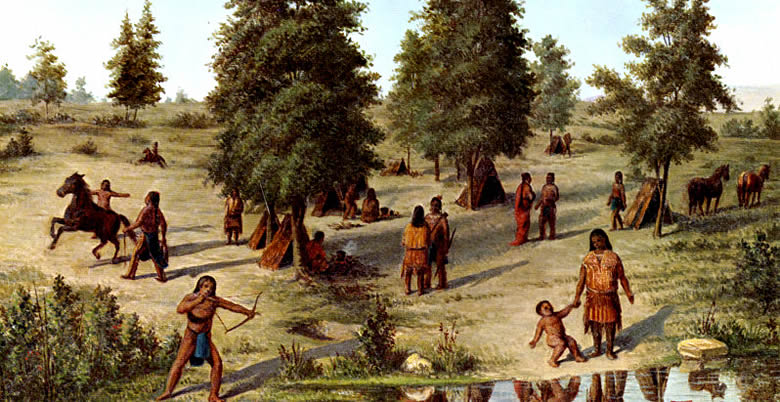 Our outpost at La Pena was intended as a protection against the predatory incursions of these savages, so almost constant scouting became a daily occupation. This enabled me soon to become familiar with and make maps of the surrounding country, and, through constant association with our Mexican guide, to pick up in a short time quite a smattering of the Spanish language, which was very useful to one serving on that frontier.
Our outpost at La Pena was intended as a protection against the predatory incursions of these savages, so almost constant scouting became a daily occupation. This enabled me soon to become familiar with and make maps of the surrounding country, and, through constant association with our Mexican guide, to pick up in a short time quite a smattering of the Spanish language, which was very useful to one serving on that frontier.
 about sixty or seventy miles east of Fort Duncan, in a section of country that had for some time past been subjected to raids by the Lipan and Comanche Indians.
about sixty or seventy miles east of Fort Duncan, in a section of country that had for some time past been subjected to raids by the Lipan and Comanche Indians.  Our outpost at La Pena was intended as a protection against the predatory incursions of these savages, so almost constant scouting became a daily occupation. This enabled me soon to become familiar with and make maps of the surrounding country, and, through constant association with our Mexican guide, to pick up in a short time quite a smattering of the Spanish language, which was very useful to one serving on that frontier.
Our outpost at La Pena was intended as a protection against the predatory incursions of these savages, so almost constant scouting became a daily occupation. This enabled me soon to become familiar with and make maps of the surrounding country, and, through constant association with our Mexican guide, to pick up in a short time quite a smattering of the Spanish language, which was very useful to one serving on that frontier.At that early day western Texas was literally filled with game, and the region in the immediate vicinity of La Pena contained its full proportion of deer, antelope, and wild turkeys. The temptation to hunt was therefore constantly before me, and a desire to indulge in this pastime, whenever free from the legitimate duty of the camp, soon took complete possession of me, so expeditions in pursuit of game were of frequent occurrence. In these expeditions I was always accompanied by a soldier named Frankman, belonging to "D" company, who was a fine sportsman, and a butcher by trade. In a short period I learned from Frankman how to approach and secure the different species of game, and also how to dress and care for it when killed. Almost every expedition we made was rewarded with a good supply of deer, antelope, and wild turkeys, and we furnished the command in camp with such abundance that it was relieved from the necessity of drawing its beef ration, much to the discomfiture of the disgruntled beef contractor.
The camp at La Pena was on sandy ground, unpleasant for men and animals, and by my advice it was moved to La Pendencia, not far from Lake Espantosa. 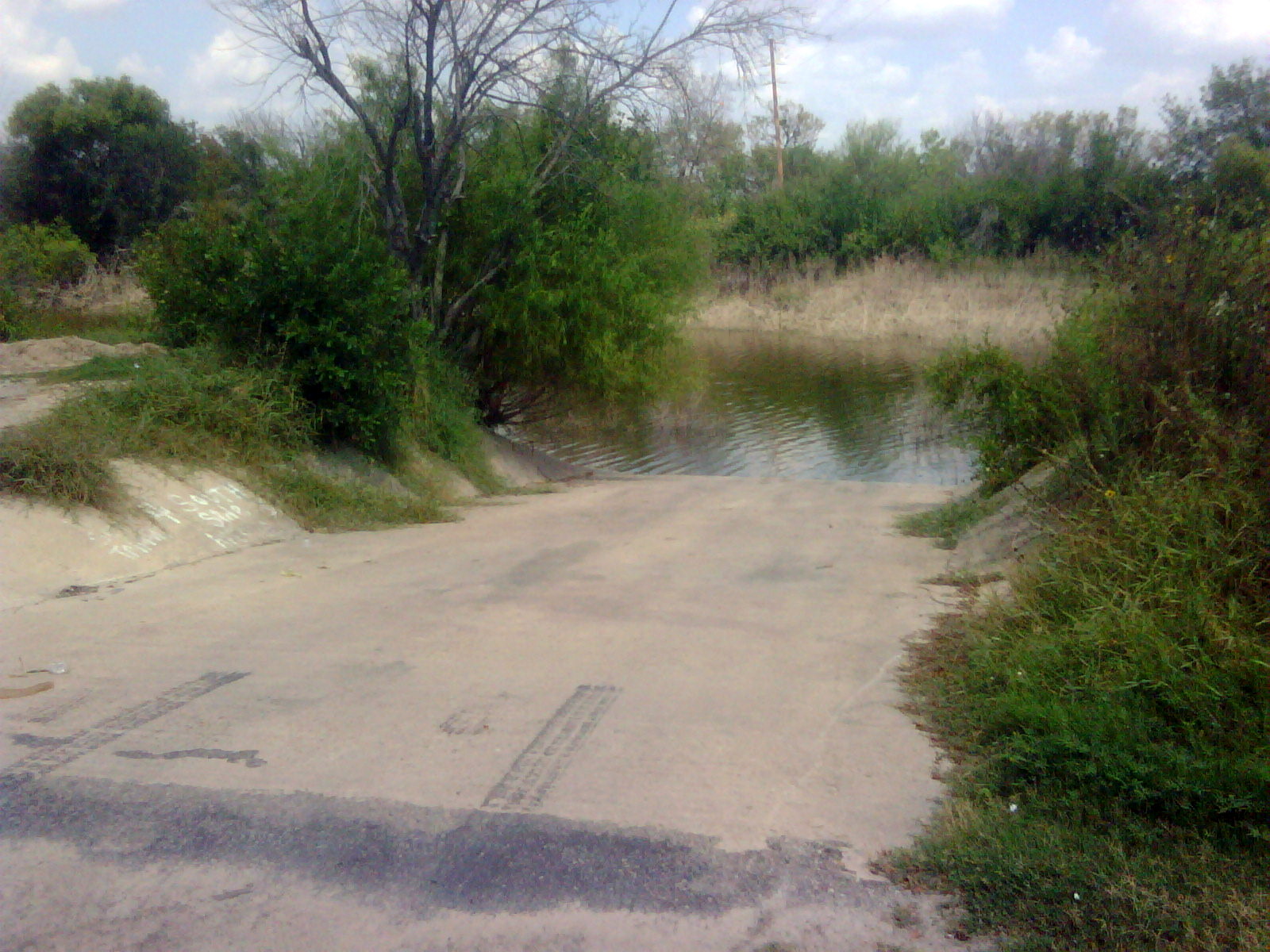 Before removal from our old location, however, early one bright morning Frankman and I started on one of our customary expeditions, going down La Pena Creek to a small creek, at the head of which we had established a hunting rendezvous. After proceeding along the stream for three or four miles we saw a column of smoke on the prairie, and supposing it arose from a camp of Mexican rancheros catching wild horses or wild cattle, and even wild mules, which were very numerous in that section of country along the Nueces River, we thought we would join the party and see how much success they were having, and observe the methods employed in this laborious and sometimes dangerous vocation. With this object in view, we continued on until we found it necessary to cross to the other side of the creek to reach the point indicated by the smoke. Just before reaching the crossing I discovered moccasin tracks near the water's edge, and realizing in an instant that the camp we were approaching might possibly be one of hostile Indians—all Indians in that country at that time were hostile—Frankman and I backed out silently, and made eager strides for La Pena, where we had scarcely arrived when Captain M. E. Van Buren, of the Mounted Rifle regiment, came in with a small command, and reported that he was out in pursuit of a band of Comanche Indians, which had been committing depredations up about Fort Clark, but that he had lost the trail. I immediately informed him of what had occurred to me during the morning, and that I could put him on the trail of the Indians he was desirous of punishing.
Before removal from our old location, however, early one bright morning Frankman and I started on one of our customary expeditions, going down La Pena Creek to a small creek, at the head of which we had established a hunting rendezvous. After proceeding along the stream for three or four miles we saw a column of smoke on the prairie, and supposing it arose from a camp of Mexican rancheros catching wild horses or wild cattle, and even wild mules, which were very numerous in that section of country along the Nueces River, we thought we would join the party and see how much success they were having, and observe the methods employed in this laborious and sometimes dangerous vocation. With this object in view, we continued on until we found it necessary to cross to the other side of the creek to reach the point indicated by the smoke. Just before reaching the crossing I discovered moccasin tracks near the water's edge, and realizing in an instant that the camp we were approaching might possibly be one of hostile Indians—all Indians in that country at that time were hostile—Frankman and I backed out silently, and made eager strides for La Pena, where we had scarcely arrived when Captain M. E. Van Buren, of the Mounted Rifle regiment, came in with a small command, and reported that he was out in pursuit of a band of Comanche Indians, which had been committing depredations up about Fort Clark, but that he had lost the trail. I immediately informed him of what had occurred to me during the morning, and that I could put him on the trail of the Indians he was desirous of punishing.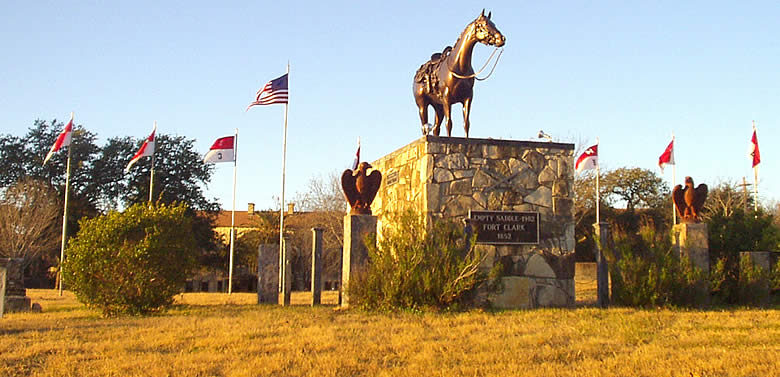
 Before removal from our old location, however, early one bright morning Frankman and I started on one of our customary expeditions, going down La Pena Creek to a small creek, at the head of which we had established a hunting rendezvous. After proceeding along the stream for three or four miles we saw a column of smoke on the prairie, and supposing it arose from a camp of Mexican rancheros catching wild horses or wild cattle, and even wild mules, which were very numerous in that section of country along the Nueces River, we thought we would join the party and see how much success they were having, and observe the methods employed in this laborious and sometimes dangerous vocation. With this object in view, we continued on until we found it necessary to cross to the other side of the creek to reach the point indicated by the smoke. Just before reaching the crossing I discovered moccasin tracks near the water's edge, and realizing in an instant that the camp we were approaching might possibly be one of hostile Indians—all Indians in that country at that time were hostile—Frankman and I backed out silently, and made eager strides for La Pena, where we had scarcely arrived when Captain M. E. Van Buren, of the Mounted Rifle regiment, came in with a small command, and reported that he was out in pursuit of a band of Comanche Indians, which had been committing depredations up about Fort Clark, but that he had lost the trail. I immediately informed him of what had occurred to me during the morning, and that I could put him on the trail of the Indians he was desirous of punishing.
Before removal from our old location, however, early one bright morning Frankman and I started on one of our customary expeditions, going down La Pena Creek to a small creek, at the head of which we had established a hunting rendezvous. After proceeding along the stream for three or four miles we saw a column of smoke on the prairie, and supposing it arose from a camp of Mexican rancheros catching wild horses or wild cattle, and even wild mules, which were very numerous in that section of country along the Nueces River, we thought we would join the party and see how much success they were having, and observe the methods employed in this laborious and sometimes dangerous vocation. With this object in view, we continued on until we found it necessary to cross to the other side of the creek to reach the point indicated by the smoke. Just before reaching the crossing I discovered moccasin tracks near the water's edge, and realizing in an instant that the camp we were approaching might possibly be one of hostile Indians—all Indians in that country at that time were hostile—Frankman and I backed out silently, and made eager strides for La Pena, where we had scarcely arrived when Captain M. E. Van Buren, of the Mounted Rifle regiment, came in with a small command, and reported that he was out in pursuit of a band of Comanche Indians, which had been committing depredations up about Fort Clark, but that he had lost the trail. I immediately informed him of what had occurred to me during the morning, and that I could put him on the trail of the Indians he was desirous of punishing.
We hurriedly supplied with rations his small command of thirteen, men, and I then conducted him to the point where I had seen the smoke, and there we found signs indicating it to be the recently abandoned camp of the Indians he was pursuing, and we also noticed that prairie rats had formed the principal article of diet at the meal they had just completed. As they had gone, I could do no more than put him on the trail made in their departure, which was well marked; for Indians, when in small parties, and unless pressed, usually follow each other in single file. Captain Van Buren followed the trail by Fort Ewell, and well down toward Corpus Christi, day and night, until the Indians, exhausted and used up, halted, on an open plain, unsaddled their horses, mounted bareback, and offered battle. Their number was double that of Van Buren's detachment, but he attacked them fearlessly, and in the fight wasThis is the 1850's coat. Dark blue with green trim.
and well down toward Corpus Christi, day and night, until the Indians, exhausted and used up, halted, on an open plain, unsaddled their horses, mounted bareback, and offered battle. Their number was double that of Van Buren's detachment, but he attacked them fearlessly, and in the fight wasThis is the 1850's coat. Dark blue with green trim.
mortally wounded by an arrow which entered his body in front, just above the sword belt, and came through the belt behind. The principal chief of the Indians was killed, and the rest fled. Captain Van Buren's men carried him to Corpus Christi, where in a few days he died.
 and well down toward Corpus Christi, day and night, until the Indians, exhausted and used up, halted, on an open plain, unsaddled their horses, mounted bareback, and offered battle. Their number was double that of Van Buren's detachment, but he attacked them fearlessly, and in the fight wasThis is the 1850's coat. Dark blue with green trim.
and well down toward Corpus Christi, day and night, until the Indians, exhausted and used up, halted, on an open plain, unsaddled their horses, mounted bareback, and offered battle. Their number was double that of Van Buren's detachment, but he attacked them fearlessly, and in the fight wasThis is the 1850's coat. Dark blue with green trim.mortally wounded by an arrow which entered his body in front, just above the sword belt, and came through the belt behind. The principal chief of the Indians was killed, and the rest fled. Captain Van Buren's men carried him to Corpus Christi, where in a few days he died.




No comments:
Post a Comment